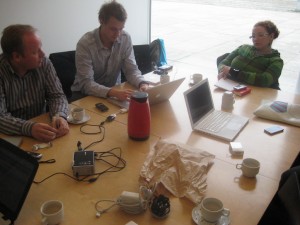#Leadership : Management is a Minefield- 10 Things the Boss Wishes You Knew…What Kinds of things Do Managers Wish Employees Better Understood? Here are 10 Things Bosses Wish Employees could Empathize with, to Realize that Being in Charge doesn’t Necessarily Mean that Every Day is a Picnic.
If you’re a part of the rank-and-file, it can be hard to get inside the head of management or your company’s leadership team. They seemingly make decisions merely to anger or stir up the lower-level employees, and the boss can be amazingly inept or unable to respond to employees’ concerns. They can devise and deploy stupid rules with little logic or reasoning, and some even seem like they’re out to get you if you rub them the right way.
It can be hard to figure out what’s going on in the C-suite. But you have to realize that the boss is only human, and has a job to do. As difficult as it is to try and rationalize or figure out the logic behind some decisions, empathizing with the decision makers can be just as hard. Giving it a shot, though, may go a long way to explaining some of their flabbergasting decisions.
What kinds of things do managers wish employees better understood? Here are 10 things bosses wish employees could empathize with, to realize that being in charge doesn’t necessarily mean that every day is a picnic.
1. “I have a boss, too.”
You have a boss, and your boss has a boss. That means that the same issues or negative feelings you’re harboring toward your boss? Your boss is harboring many similar feelings toward their boss. Everyone’s a part of the chain, when it comes down to it. Even the CEO — they answer to shareholders.
Like this Article ? Share It ! You now can easily enjoy/follow/share Today our Award Winning Articles/Blogs with Now Over 2.5 Million Growing Participates Worldwide in our various Social Media formats below:
FSC LinkedIn Network: (Over 15K+ Members & Growing !) www.linkedin.com/in/frankfsc/en
Facebook: (over 12K) http://www.facebook.com/pages/First-Sun-Consulting-LLC-Outplacement-Services/213542315355343?sk=wall
- Google+: (over 800K)https://plus.google.com/115673713231115398101/posts?hl=en
- Twitter: Follow us @ firstsunllc
educate/collaborate/network….Look forward to your Participation !
Continue of article:
2. Honesty goes a long way
If you can get something done, great. If not, don’t pretend that you can — just tell your boss so they can figure out an alternative. If your manager or team leader is counting on you to take care of something, especially after you’ve assured them that you can do it, they’re banking on the fact that you will. Don’t blindside them at the last minute by coming up short. Just be up front about your ability to handle a given task.
3. Scheduling is very difficult
In certain businesses and workplaces, scheduling employees is a nightmare. If you’ve worked in a restaurant, for example, you have an idea of the juggling act that building a schedule can be. Many employees have school, families, or other jobs they need to attend to, and asking for a day off at the last minute isn’t as easy as slotting in another name.
4. 9:00 does not mean 9:10
Some jobs allow for some leeway in when you come and go to work. Others do not. If your boss needs you at work on time, that means you need to be there on time — not 10 or 15 minutes late. You may send the message that you’re not coming in at all, and send the rest of the staff scrambling to cover your station. Everybody’s late from time to time, but if you make it a chronic habit? You’re only giving your boss ulcers.
5. If you’re quitting, let them know
People quit jobs all the time. But there’s a reason the “two week” rule exists — it allows both parties, the quitter and and the employer, to have some time to cover their bases. Yes, companies lay people off with little or no warning all the time, but if you have a good relationship with your employer, or don’t want to burn any bridges on the way out, give a heads up so they can replace you.
6. They don’t want to be there on Saturday or Thanksgiving either
Yes, working nights, weekends, and holidays sucks. Nobody wants to be there, not even management. But the world doesn’t stop just because it’s your favorite holiday, or because it’s Sunday. Somebody has to work, and somebody has to take the reins. If you’re complaining about having to work Black Friday, your complaints are probably falling upon deaf ears; your boss is probably just as stoked to be there as you are.
7. The boss isn’t out to get you
Management doesn’t want you to fail. They’re not typically setting traps or land mines for you to walk into, to give them a reason to dock your pay or write you up. They want you to do your job and be good at it. If you’re doing well, it makes your manager look better. Sure, some employee-employer relationships can fray, but it’s rare that someone in charge is gunning for you. Paranoia isn’t going to help.
8. They’re your boss, not your friend
Ever hear about awful parents who try too hard to be “cool,” and let their kids run amok? It’s similar in the workplace. Your boss is there to manage you, not be your bud. While you may have a good relationship with your manager — which is great — you don’t need to tell them how trashed you got last night or invite them to smoke a joint with you during a break. Respect the relationship, and professional boundaries.
9. Management knows you’re screwing around all day
Do you really think nobody realizes that you spend half of your day surfing Facebook, Snapchat, and Reddit? They know — so you don’t have to scramble to cover your tracks every time you’re on your phone and somebody walks up behind you. Of course, if you’re on the sales floor or in a customer service position, then this can be a real problem. But managers know that you’re not always being productive.
10. Saying “I don’t know” is OK
Sometimes, you’re not going to know the answers. Not sure how to work a machine or piece of equipment? Ask for a run-through. Does a customer have a complicated issue or question? Don’t B.S. them, and give them bad information. Even if it’s a little uncomfortable, ask for help from a higher-up, and treat it as a learning experience.
Follow Sam on Facebook and Twitter @SliceOfGinger
CheatSheet.com | July 30, 2016 | Sam Becker











